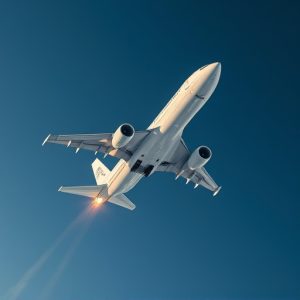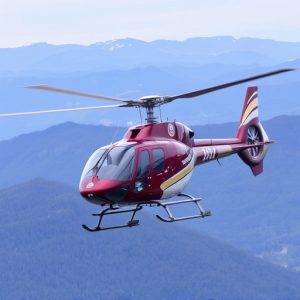Artificial Intelligence (AI) is transforming aerospace by optimizing flight safety, efficiency and maintenance. AI algorithms predict weather patterns for safer routes, power drones for hazardous surveillance, detect anomalies to prevent failures, and analyze data for improved spacecraft design. Machine learning predicts component failures, enhancing scheduling and reducing costs. In space exploration, AI analyzes vast data from satellites and probes, enabling autonomous systems to collect samples and map terrain, paving the way for future human missions.
Artificial Intelligence (AI) is no longer a futuristic concept but a reality transforming the aerospace industry. From enhancing flight safety through machine learning algorithms that predict and mitigate risks, to optimizing spacecraft design using advanced AI models, this technology is pushing the boundaries of what’s possible in space exploration. This article delves into the various applications of AI in aerospace, exploring its potential to revolutionize air and space travel while highlighting future prospects for AI-driven space exploration.
- AI in Aerospace: Transforming Sky's Limit
- Enhancing Flight Safety with Machine Learning
- Optimizing Spacecraft Design Using AI Algorithms
- Predictive Maintenance for Aerospace Vehicles
- Future Prospects: AI-Driven Space Exploration
AI in Aerospace: Transforming Sky's Limit
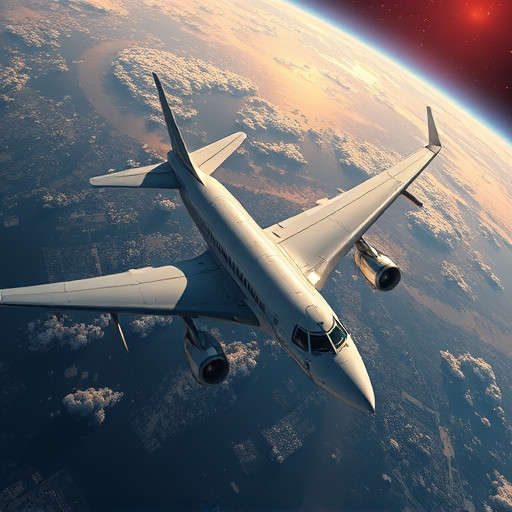
The integration of Artificial Intelligence (AI) in aerospace is pushing the boundaries of what was once thought possible. From optimizing flight operations to enhancing safety and efficiency, AI algorithms are transforming every aspect of sky travel. These technologies can predict weather patterns with unprecedented accuracy, allowing pilots to chart the safest and most fuel-efficient routes.
Moreover, AI-powered drones and autonomous vehicles are revolutionizing surveillance and inspection tasks, reducing human risk in hazardous environments. Machine learning models analyze vast datasets to identify patterns and anomalies, enabling early detection of potential aircraft failures or security threats. This not only improves flight safety but also streamlines maintenance schedules, minimizing downtime. With AI at the helm, aerospace is experiencing a profound metamorphosis, promising a future where travel across the skies is safer, more efficient, and environmentally sustainable.
Enhancing Flight Safety with Machine Learning
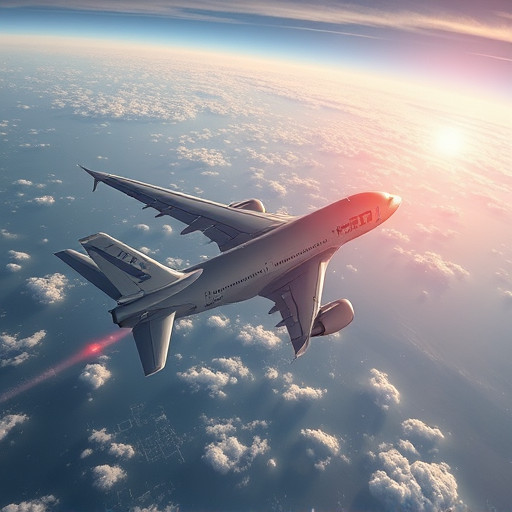
Machine learning is transforming flight safety by analyzing vast amounts of historical data to predict potential issues and prevent accidents. This technology can identify patterns in maintenance records, sensor readings, and pilot reports that might otherwise go unnoticed. By doing so, it enables proactive measures to be taken, reducing the risk of failures and enhancing overall aircraft reliability.
Furthermore, machine learning algorithms power advanced fault detection systems, which continuously monitor various components during flight. These systems can detect anomalies in real-time, alerting crews to potential problems before they escalate. This early warning system not only improves safety but also optimizes maintenance schedules by focusing on genuine issues, reducing unnecessary inspections and associated costs.
Optimizing Spacecraft Design Using AI Algorithms
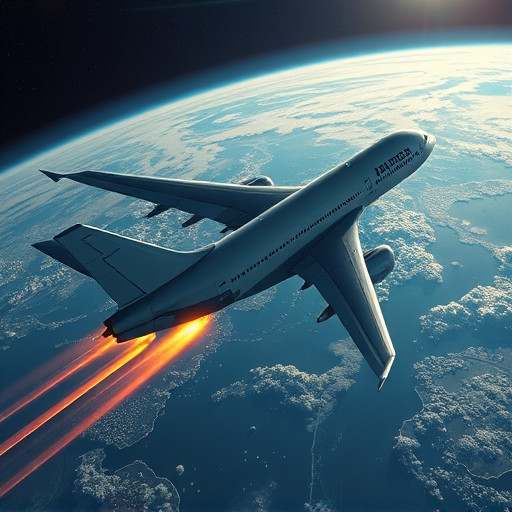
AI algorithms are transforming spacecraft design by offering innovative solutions and enhancing optimization processes. These algorithms can analyze vast amounts of data from previous missions, simulating various scenarios to identify the most efficient configurations. By considering factors like aerodynamic performance, structural integrity, and weight distribution, AI models predict optimal material choices, component placements, and overall craft shapes. This approach not only reduces design time but also minimizes costs and potential risks.
Moreover, machine learning techniques enable continuous improvement by learning from real-time data during flight operations. This allows for adaptive adjustments to navigate unpredictable conditions, ensuring the spacecraft remains within performance parameters. As AI continues to advance, its role in spacecraft design will become even more pivotal, paving the way for more capable and efficient exploration missions.
Predictive Maintenance for Aerospace Vehicles
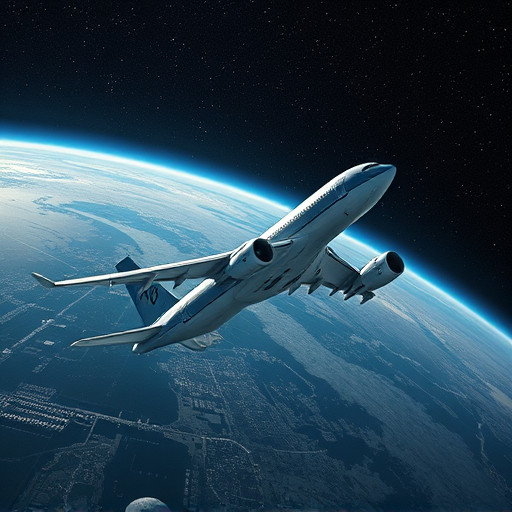
AI is transforming predictive maintenance in the aerospace industry by leveraging vast amounts of historical and real-time data from sensors embedded in aircraft components. This enables more accurate predictions of potential failures before they occur, reducing costly downtime and enhancing safety.
Machine learning algorithms can identify patterns and anomalies that might be invisible to human analysts, allowing for proactive maintenance strategies. By anticipating component wear and tear, airlines can optimize their scheduling, reduce unexpected repairs, and improve overall operational efficiency. This advanced approach not only minimizes financial losses but also plays a vital role in ensuring the safety of flight operations.
Future Prospects: AI-Driven Space Exploration
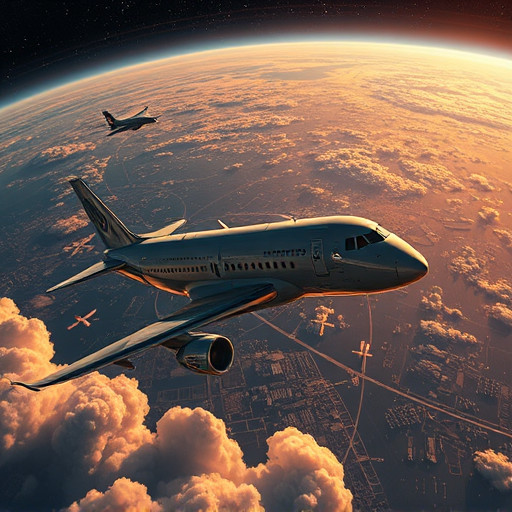
The future of space exploration holds immense promise with Artificial Intelligence (AI) at its helm. AI technologies can significantly enhance our understanding and navigation of the cosmos, enabling more efficient and safer missions. By analyzing vast amounts of data from satellites and space probes, AI algorithms can identify patterns, predict outcomes, and optimize performance, leading to groundbreaking discoveries.
In particular, AI-driven autonomous systems could explore remote and potentially hazardous regions of space that are currently inaccessible or too dangerous for human astronauts. These robotic explorers could collect valuable samples, map unfamiliar terrain, and even construct essential infrastructure in preparation for future human missions. As AI continues to evolve, its role in space exploration is poised to become increasingly pivotal, opening up a new era of discovery and expanding our reach beyond Earth’s boundaries.
AI is no longer a futuristic concept but a reality transforming the aerospace industry. From improving flight safety and optimizing spacecraft design to predictive maintenance and space exploration, its applications are vast and promising. As we look ahead, AI’s potential to revolutionize air and space travel is undeniable, paving the way for safer, more efficient, and ultimately, a deeper understanding of our universe.

